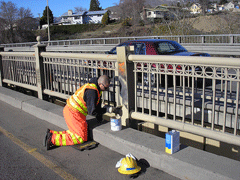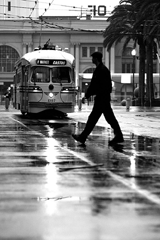The Bus Stops Here
Air Date: Week of March 6, 2009

More than $8 billion in economic stimulus money will pay for new streetcars, buses, and trains, but not operating costs like wages for bus drivers or train conductors. (Photo: Thomas Hawk)
President Obama’s stimulus package devotes over eight billion dollars to beef up public transportation, but that won’t help fund the day-to-day costs of buses and trains, nor will it stop cuts to service. The federal gas tax pays some of the running costs, but has been stuck at 18.4 cents for 16 years. Matthew Welbes of the Federal Transit Administration talks with host Bruce Gellerman about some options for funding public transportation.
Transcript
GELLERMAN: For President Obama, the road to economic recovery begins in the fast lane to the Department of Transportation.
A week before the DOT was supposed to get $26.6 billion authorized in the stimulus package, the President traveled to the Transportation Department to hand over the money.
OBAMA: Transportation projects that were once on hold are now starting up again as part of the largest new investment in America’s infrastructure since President Eisenhower built the interstate highway system.

President Obama and Vice President Biden visit the Department of Transportation to announce the release of $26.6 billion to fund highway infrastructure projects. Secretary of Transportation Ray La Hood is on the right. (Courtesy of the Department of Transportation)
Matthew Welbes, a senior official with the Federal Transit Administration, says $8.4 billion goes to public transportation.
WELBES: The way the Congress wrote the law, it’s money for capital purchases, so it’s for buying new buses, it’s for buying new subway and street cars, it’s for fixing up passenger stations, fixing up the maintenance facility where the buses and the rail vehicles are maintained. And there’s a significant backlog of investment needed to make our public transportation service really, really better quality for the customers, and to make it move more efficiently. And so, these resources will help recapitalize our nation’s transit assets.
GELLERMAN: But it’s not going to help places like St. Louis that’s really hurting. It’s going to be cutting 2,300 bus stops out of 9,000. It’s cutting a quarter of its staff, just at the end of March.
WELBES: Bruce, it’s something we’re observing really across the country right now. And we’re seeing sales revenues that are often the funding source, local funding source for public transportation declining, as the – during the economic downturn. Right now, federal transit funding comes in part from the gas tax. The gas tax has remained in the same place since 1993. And so we’ve seen an erosion of about a third in the, you know, value of the gas tax, particularly as it’s declined, you know, due to inflation. So 2.86 cents out of the 18 cent gas tax goes to public transportation. But as people have stopped driving as much and using as much gasoline and more importantly, as a lot of vehicle sales have declined, the funding that supports both highways and mass transit is declining. And so, while we’re seeing transit ridership at record levels. We also see this revenue decline.
GELLERMAN: You know Mr. Welbes, United States government is bailing out the banks and the insurance industry and the auto industry and I don’t think anyone intends that this stimulus money be used as a bailout for public transportation, but what’s the answer. How can we make public transportation self sufficient?

Nearly $27 billion has been allocated for creating jobs in bridge and highway repairs. (Courtesy of the Washington State Department of Transportation)
GELLERMAN: I know there was a Congressional blue ribbon commission just recently came out with the funding saying okay, we’ve gotta in the short term raise the tax on gasoline at the federal level and then we’ve gotta switch over to something completely different- we’ve gotta get into some kind of tax on the miles you actually drive in your car.
WELBES: That’s right, there are two different commissions, they are federal commissions and in the last year both of those commissions reached somewhat the similar conclusions, and they’re recommendations involve raising the gas tax or indexing the gas tax to inflation over time, looking at vehicle miles traveled charges. The President has noted that at this moment we have an economic downturn - raising the gas tax is not on the to do list.
GELLERMAN: So how would a fee on the miles driven work exactly?
WELBES: Sure. The way it would work is a car would have a transponder on it., And as you drive it would record where you’ve driven, when you’ve driven. And for example, in a test that was done out in Oregon a few years back, at the time I believe, a person pulled their car into a gas station it would record some key information and the individual’s car would then be charged based on their travel. And so it’s information about, you know, the time of day when one’s traveling and how far one’s traveled, where one’s traveled and so it’s a more discrete charge in the same way that you’d pay a different fair to fly on an airplane depending on what time of day you choose to fly.
GELLERMAN: Boy, can you say Big Brother?
WELBES: Well, that’s one of the concerns. I think First Amendment concerns are among one of the issues that would need some sort of resolution. I know that proponents of VMT charges have described the ability to make anonymous such information. I think that’s something that people interested in the First Amendment would want to understand more clearly, but it’s one of the issues to resolve.

More than $8 billion in economic stimulus money will pay for new streetcars, buses, and trains. (Photo: Thomas Hawk)
WELBES: It’s substantial. I think one of the things we learned last summer is that four dollars a gallon is a point where people dramatically change their travel behavior and what we’re also now seeing this that because of the economic downturn, some of the things that happened over the summer remain in place. And you know, we experienced a notable increase in public transportation use during the past year as well for those same two reasons.
GELLERMAN: You know, transportation needs roads and bridges and those types of things. Those are planned decades in advance. Could it be that we’re planning the wrong transportation mix for the future, that is as ridership increases on public transportation, and miles driven goes down, maybe we got it wrong.
WELBES: As we go forward in our country, we want to be sure that we make investments not only in transportation but in the way we develop our land and we build our housing and our businesses so we can create choices for people, so that they can choose to travel by transit to get to school, to reach work, to visit the doctor or even to design communities so that there are trips that are not taken, so that in order to get that loaf of bread or to get a hair cut, a person can walk to some place near by. And so if we create urban forum that is less auto oriented, more supportive of transit and walking, we create places where in the future our investments will support lower emissions and fewer green house gases.
GELLERMAN: Matthew Welbes is acting deputy administrator for the Federal Transit Administration. Mr. Welbes, thanks a lot.
WELBES: Thank you Bruce
Living on Earth wants to hear from you!
Living on Earth
62 Calef Highway, Suite 212
Lee, NH 03861
Telephone: 617-287-4121
E-mail: comments@loe.org
Newsletter [Click here]
Donate to Living on Earth!
Living on Earth is an independent media program and relies entirely on contributions from listeners and institutions supporting public service. Please donate now to preserve an independent environmental voice.
NewsletterLiving on Earth offers a weekly delivery of the show's rundown to your mailbox. Sign up for our newsletter today!
 Sailors For The Sea: Be the change you want to sea.
Sailors For The Sea: Be the change you want to sea.
 The Grantham Foundation for the Protection of the Environment: Committed to protecting and improving the health of the global environment.
The Grantham Foundation for the Protection of the Environment: Committed to protecting and improving the health of the global environment.
 Contribute to Living on Earth and receive, as our gift to you, an archival print of one of Mark Seth Lender's extraordinary wildlife photographs. Follow the link to see Mark's current collection of photographs.
Contribute to Living on Earth and receive, as our gift to you, an archival print of one of Mark Seth Lender's extraordinary wildlife photographs. Follow the link to see Mark's current collection of photographs.
 Buy a signed copy of Mark Seth Lender's book Smeagull the Seagull & support Living on Earth
Buy a signed copy of Mark Seth Lender's book Smeagull the Seagull & support Living on Earth

